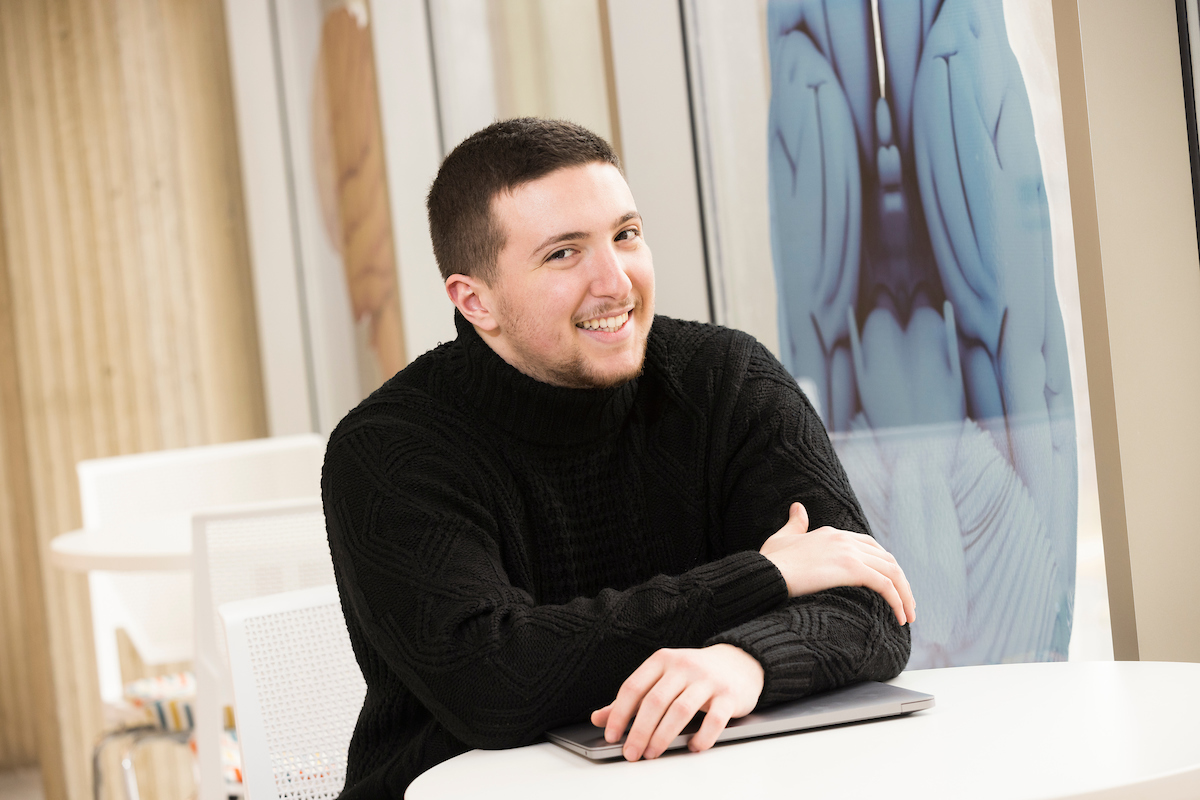Playground study leads to communications breakthrough
Psychology major Derek Order's mission is to improve the lives of children diagnosed with autism spectrum disorder

Improving the lives of children diagnosed with autism spectrum disorder has always been the goal of Binghamton University’s Institute for Child Development. Binghamton undergraduate Derek Order aims to bring the center one step closer to achieving it.
Order, the oldest of three siblings, always knew he wanted to work with children. He also had a deep curiosity about developmental disabilities, but it wasn’t until the Long Island native came to Binghamton University that he decided to combine these interests. Now he’s a junior majoring in psychology with a concentration in autism spectrum disorder (ASD) and a minor in education.
“I always had an interest in understanding behavior,” Order said. “In regard to ASD, that was introduced when I got to Binghamton and that’s where my interest piqued, but prior, I did a lot of work with children with developmental disabilities through a few programs they had at my high school. I always had a lot of involvement volunteering with kiddos and it’s something I’m very passionate about.”
Before college, Order didn’t have a particular interest in any one disability. It wasn’t until he met his mentor, psychology Professor Jennifer Gillis Mattson, that he decided to focus on autism. The duo have worked together on two large projects within the Institute for Child Development (ICD), where Order is a teacher’s aide and writing a program evaluation report with graduate student Jessica Granieri.
The report focuses on his independent research project for the Summer Scholars and Artists Program, a unique examination of the use of augmentative and alternative communication (AAC) strategies and devices. Order wanted to gauge how well children would use the devices in a naturalistic environment, like a playground, instead of a classroom.
Because many autistic children have communication difficulties or are non-speaking, at the institute, most students use AACs to make requests and answer questions from those around them. AACs can range from apps on iPads and mobile devices to whole communication boards or small binders containing multiple pictures and words, all of which allow a child to use digital or physical pictures, symbols and sentences for communication. But bringing a tablet or binder on slides, swings and other playground equipment can be a safety hazard and get in the way of the fun.
Order wondered if there was a way for children to communicate about their playground experiences without having to go back and get their AAC device. He noticed that some playgrounds had added communication boards to be more inclusive, but it was unclear if adding them would be helpful to children at the institute, given the limited research about their use.
Order worked closely with the institute’s speech language pathologists (SLPs) to develop AAC supports available throughout the playground and to examine what types of additional support might be needed.
At the end of the summer, Order’s research concluded with an unexpected finding — that just having AAC supports available (even if children know how to use them) does not facilitate use of the supports for communication. The staff needed to be trained in encouraging the students to communicate using the AAC supports on the playground. Once this happened, there was much more communication success.
“Derek was involved in all aspects of this project. He made all of the materials, consulted frequently with the SLPs, collected data, problem-solved the inevitable hiccups in applied work and evaluated the outcome of the project,” Gillis Mattson said.
Although the experiment was conceptualized and conducted by Order, his proudest achievement at the institute is the friendships he has made with children.
“Genuinely, regardless of the research — which I am grateful for — I have always just loved interacting with the kids and building rapport,” Order said. “I work in a classroom with 3- to 5-year-olds and 9- to 10-year-olds, and the relationships with the kids are so pure and they make me so happy. The thing I love the most is just hanging out with them, but if I can also do research that might aid them in some way and help foster independence, I am quite fulfilled by that.”
Order plans to pursue a doctorate in school psychology following graduation. One of his larger goals for his research is to find more ways to support and amplify the voices of self-advocates in the ASD community, while also encouraging continued learning for teachers and school administrators. He believes everyone should be willing to meet children with autism halfway, as opposed to trying to make them behave more “typically.”
Beyond the institute, Order has also found success as a peer consultant with the Fleishman Center for Career and Professional Development. He helps students with resumes and cover letters, along with advising first-year psychology majors about what steps they should take to reach their goals effectively.
“If you’re interested in research or getting involved, go and talk to people, go talk to your professors,” Order said. “If I didn’t go to Dr. Gillis’ office hours and talk about what I wanted to do after college, my life would be totally different. Experience doesn’t just fall from the sky, I had to put myself in the position to get lucky. It’s important to talk to the pros, those who know and feel what you’re going through!”
This article first appeared in Discover-E.
